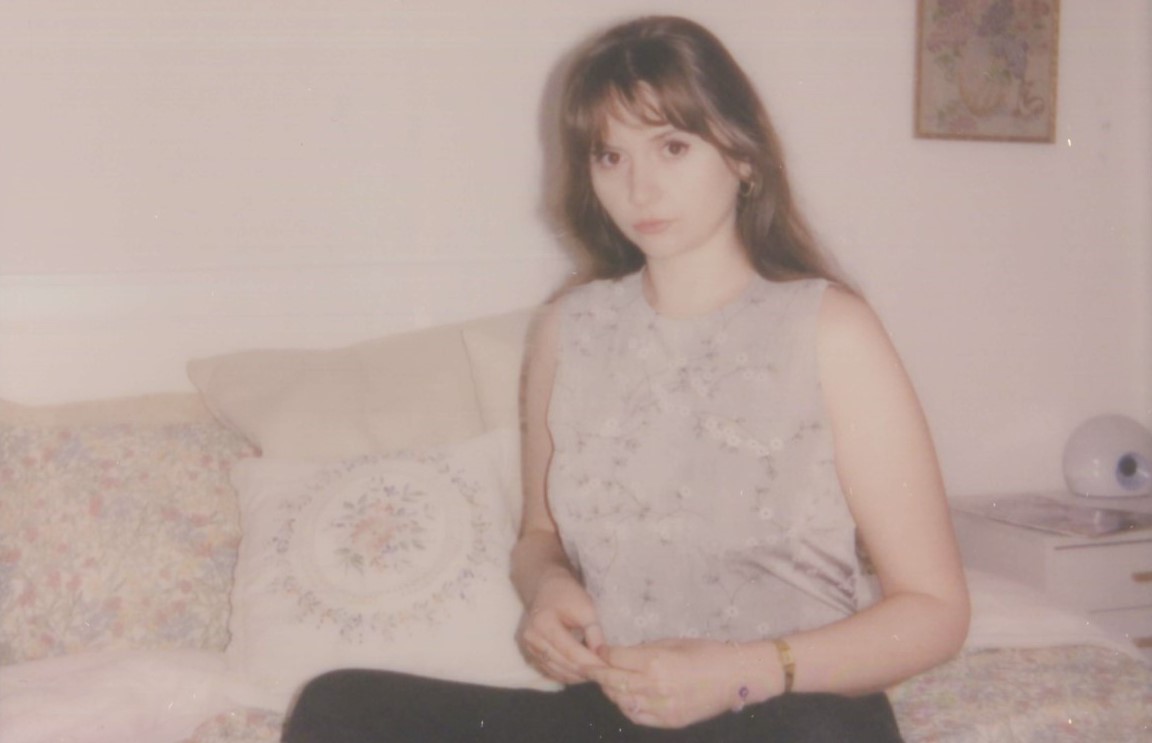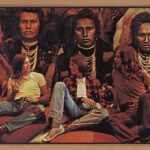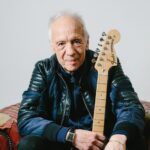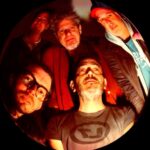
Singer-songwriter Honey Gentry speaks to Jason Barnard about her creative process, influences, and the themes that shape her music where escapism, dreams, and mythology intertwine.
Your latest single, “Under Taurus,” draws inspiration from a poem by Louise Glück. What drew you to this particular poem?
I actually think I came across Louise Glück on Tumblr (where else!) although I can’t remember what it was that I had seen. Then someone dropped me a message to tell me about the website, Voetica, where I went on to explore more of her work. I don’t know a huge lot about poetry so it was all new to me. But I was really drawn to her explorations of nature and family.
With this particular poem, it reminded me of being a child and looking at the stars with my dad in the countryside. With the lyrics, I wanted to explore that feeling but incorporate how it feels when the person you’re with is pointing to something you can’t see.
Whether it’s something in the sky or about ourselves, what do we lose by saying we see something but we don’t, just to make them happy with us?
Can you share a bit about your influences – which artists shaped your artistic style and why?
In regards to my artistic style I would say Lana, of course – not only her sound and her impact on music, but also her approach to her work is a big influence on me. I’m really grateful for how she has created a path behind her for singers like me to tentatively walk as well.
Sufjan Stevens is another huge influence on me for both sound or style and approach – particularly as an entirely independent artist.
Weyes Blood, especially her album “Titanic Rising” for how immersive it is sonically.
Kate Bush, in particular “Hounds of Love” or “Never For Ever” which are the albums I grew up listening to with my dad.
Marina, in particular “Electra Heart”, for the way she uses commercial pop music to explore dark lyrical themes. I was a fan of hers as a result of The Family Jewels, I even used to read her blog obsessively, but I had Electra Heart on repeat for years.
Although it might not come through in my sound, another huge impact on me is My Chemical Romance, simply because of the influence they had on me and how much I adored them as a teenager. I feel like they were my first guiding light in the kind of artist I would want to be – completely true to what they were doing. When I finally got to see them live last year it was such a special moment for me.
“Under Taurus” has a celestial quality with dreamy synths and layered vocals. How do you go about creating such a sonically immersive experience in your music?
Thank you very much! Funnily enough, layering my vocals in the way that I do started out as a practical workaround – when I started out, I just couldn’t get the sound I wanted or would often be unhappy with the raw sound of just one vocal performance; and I found that when I layered the vocals I was happiest with them. Now I feel like it’s a trademark of the music.
Although it varies, I try and start with something like a piano or a wurli, to make sure that I can lay down the chords and structure in a truthful way, even if I strip that voice back later. From there, a simple bass line to anchor the music before I try and introduce the orchestra, since I feel like that’s the part that brings the spirit to the tracks soonest and is how I introduce some of the melodies to the music. Lately I’ve been using the Spitfire BBC Orchestra which has led to some really inspiring results, especially from the strings and woodwind. Next, I’ll generally try and add my percussion to introduce a heartbeat. Then, I really allow myself the time once I bring in the synths because that’s the fun part to me! Generally I build with a lot of the presets that you can find in Logic as well as some plugins from Soundpaint or Spitfire; the fun part is customising them to achieve your vision. I like my synths to sound like you’re underwater or hearing them from another room. I like the suggestion of a sound rather than an on-the-nose voice in the mix.
In addition to your music career, you work as a video editor. How does your visual work influence your music, and do you see any overlap between the two creative fields?
I actually find that I use different parts of my mind for the different things I’m doing. Editing is rather cerebral to me, I think in part because it is my job so naturally I bring more of a logical discipline to what I’m working on, but also because I was formally trained. Music, on the other hand, is an entirely self taught endeavour, led fully from the heart so it feels more of an emotional experience making a song. My editing job is in the world of social media, so it’s actually very different to how I make music – it’s a lot more fast paced and extroverted with an eye on trends; whereas making music is an inward, isolating experience for me with very little outside consideration. I think the fact that I get to do both, allows me to see the difference and to understand there’s room for both in my life.
Your music is often described as cinematic and nostalgic. Your videos have drawn from vintage footage and films including The Virgin Suicides. Could you tell us more about how you infuse elements of old Hollywood and mythology into your image, videos and songs?
One of the things I like about both old Hollywood and mythology or history is the way we can see our human experience and archetypes play out before us. And that can be an endless source of inspiration – whether it’s Aphrodite, or Marie Antoinette or Lux Lisbon or Marilyn Monroe. Our symbols say something about us I think – namely based on how they make us feel. Our symbols are a language in their own right.
The reason I love using footage from places like the Prelinger archives, where people’s real home movies have been digitised and archived – this was a moment in human history that someone thought important or special enough to capture forever, and sometimes it’s just a flower in their garden or a wedding or their child at Christmas. And it has just as much value to me in regards to its story and the emotions it can elicit, as a crafted Hollywood movie or an ancient myth.
You recorded an enchanting cover of “Playground Love” originally by AIR. What made you choose this particular track, and how did you bring your own unique style to the cover?
Thank you so much – I have loved that song for many years and really, it was a desire to push myself with the production that I chose it. Of course, The Virgin Suicides – both the book and the film really, and of course the soundtrack – have had a big influence on the sonic world of my work, so it was also a way for me to bring that reference into the Honey Gentry world further.
Can you share any insights into your songwriting process? How do you capture and express your personal experiences in a way that resonates with others?
I collect images and ideas as I go about my day, for example whilst I was writing Nebula, which opens the EP, I came across an article of new images detecting a black hole swallowing a star. How even stars out in space have births and deaths and can meet violent animalistic, humanised ends really stood out to me and the image or idea was in my mind for a while. To sum it up in its most basic sense a nebula is a cloud of dust and gas in interstellar space out of which stars are formed or ‘born’. We also use the term “a star is born” in this colloquial Hollywood sense and the parallel between deep space and Hollywood just seemed too perfect for me not to write about it. “Somewhere in space there’s a star being born / Nothing but dust and a desire to form” has become one of my favourite lyrics I have ever written.
In your songwriting process, do you find yourself gravitating towards certain key topics or recurring themes? If so, what are they, and what significance do they hold for you personally?
I would say key recurring themes in my work are childhood, nostalgia, and reflecting on the past; space, water, and California. I suppose because the first three are inner pre-occupations, sometimes coming from a place of sadness or pain; whereas the latter are awe inspiring to me. California in particular, it’s a place I love physically, with its varied and inspiring coastlines and canyons and forests and deserts. But also culturally a place like Hollywood, where over the last 100 years or so, thousands (maybe millions) of peoples’ dreams and desires and hopes and failures have focused and concentrated on this one spot on the map whether they were there in person or only saw it in their daydreams. For me there’s something significant in the energy of a place like that. It’s palpable.
If someone is new to your music and wants to explore your back catalogue, which three tracks would you recommend they start with and why?
Heaven California – because it was the first song I wrote when I knew “Honey Gentry” was coming to life, even if I didn’t know who she was yet or her name.
Aphrodite – it went on to shape my voice and clarify my vision as a producer. I was so unsure when I released it, and the fact it has connected me with so many people is very special to me. It really gave me the confidence to work entirely on my own.
Like Neptune – because it’s one of my favourite songs lyrically, and a letter to my younger self. In writing it I hoped my younger self was out there and might hear it and feel comfort.
With the rise of streaming platforms and social media, there is both greater access to a global audience and increased competition. How do you differentiate yourself as an independent artist and make a lasting impression on listeners amidst the vast sea of music available?
I have a sense of acceptance about the amount of competition there is out there; there is so much music and so many artists but I do really believe there is room for all of us. I don’t try to force anything as a result of it, or think about it at all really.
I have two goals with my music – to reach the people whose hearts are open to it, and to be authentic to myself with everything I do. I feel like no matter what comes of it, if I do those two things, I will be happy with my music. But funnily enough, it has turned out that has been the key for me and growing as a presence in the small way I have, over the last few years. You’ll never make music that’s for everyone, so it’s a blessing to me when it is for someone. Because first and foremost, it is for me.
I see my listeners as people who must have something about them that’s similar to me, in their heart or spirit. So of course, I appreciate them very much, and try to let them know that any time I can. I have met so many wonderful people as a result of putting my music out there.
How do you envision the future of your music? Are there any new directions or collaborations you are excited about exploring?
I’m excited to continue growing as a producer. With every release I feel like I am developing my sound not just as a lyricist or singer but in the production as well. I get quicker and more confident in my decisions and I enjoy the process more and more each time. I’m also excited to start branching out into crafting music for other mediums, more to come on that soon I hope!
What message or feeling do you hope listeners take away from your music, particularly from your latest single “Under Taurus” and your upcoming EP?
That you can absolutely transform pain into peace.
Further information
“Under Taurus” is available now, New EP Different Water is available from Tuesday 23 May 2023. Further details can be found at Honey Gentry’s website and on social media: Instagram / Twitter




